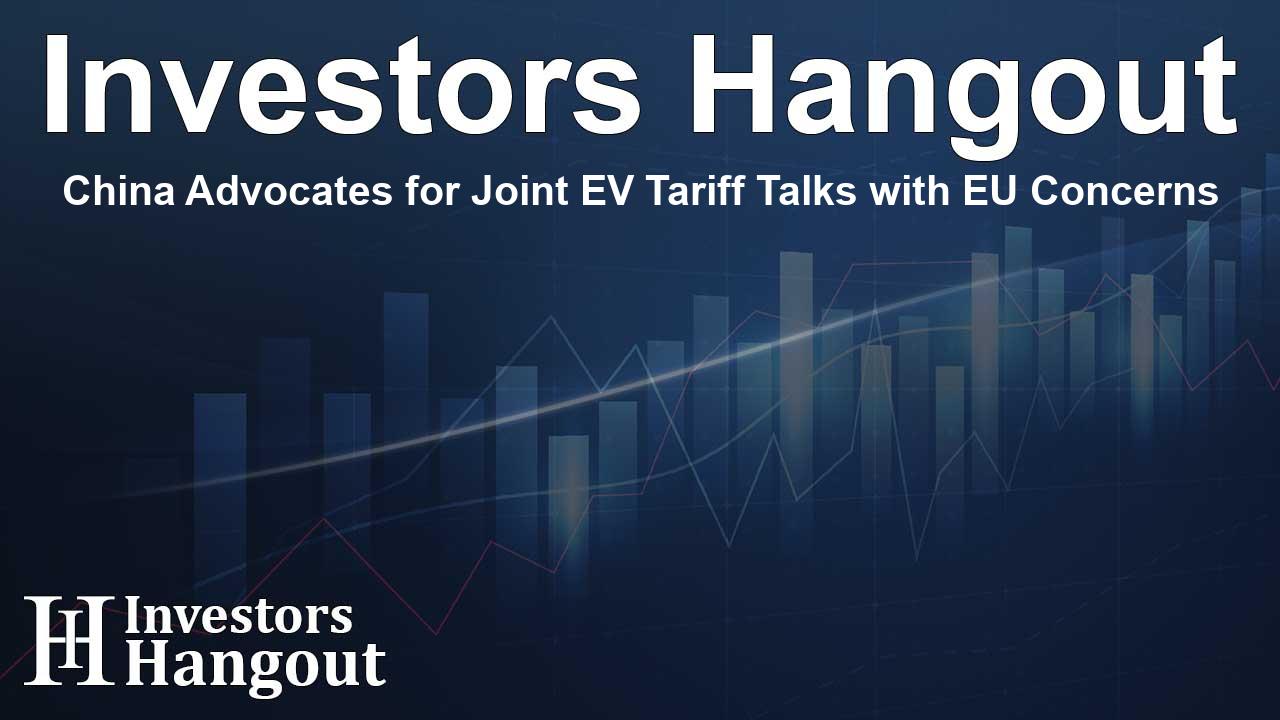China Advocates for Joint EV Tariff Talks with EU Concerns

China Urges EU for Unified EV Tariff Discussions
In an intriguing turn of events, China is calling on the European Union (EU) to forgo individual negotiations concerning the pricing of electric vehicles (EVs) manufactured in China. This appeal comes at a crucial moment when both parties are engaged in pivotal tariff talks. The Chinese government has expressed that separate discussions on pricing could dangerously destabilize the ongoing tariff negotiations.
Concerns Over Price Negotiations
The worries were articulated by Chinese officials in statements released through the Ministry of Commerce. They indicated that any attempts by the EU to engage in distinct price negotiations could disrupt the already sensitive discussions surrounding tariffs on EVs. China's concern stems from the recent rejection of a proposal that sought to set a minimum price of €30,000 (approximately $32,000) for Chinese EVs, a strategy designed to circumvent potentially punitive tariffs that Brussels might impose next month.
The Implications of EU's Rejection
Brussels' dismissal of China's pricing proposal has exacerbated tensions between the two economic powerhouses. It indicates a growing divide and raises questions about the future of trade relations regarding the EV markets. There’s a significant reliance on collaborative trade agreements, and such unilateral decisions could send ripples through the entire EV industry, impacting manufacturers, consumers, and import-export dynamics.
Understanding the EV Market Landscape
The global electric vehicle market has been rapidly evolving, with increasing competition influencing pricing strategies and trade policies. China, being a key player and a major manufacturer of EVs, is keen on maintaining its competitive edge. Ensuring favorable tariff conditions is essential for sustaining its market position and fostering growth. The stakes are high as many countries, including members of the EU, are ramping up their commitments to reduce carbon emissions and transition towards greener alternatives in transportation.
China's Position in the Global EV Market
As one of the largest producers of electric vehicles, China focuses on expanding its market share in Europe, a region that is progressively embracing electric mobility. However, with increasing scrutiny over pricing and potential tariffs, the trade relationship with the EU carries significant weight. This is not merely about pricing negotiations; it embodies broader economic strategies and mutual dependencies that define international trade in the EV sector.
Conclusion
As discussions evolve, the need for a unified approach in negotiations becomes more apparent. China’s plea to the EU serves as a reminder of the intertwined nature of international trade and diplomacy, especially in sectors crucial for sustainable development and economic growth. Both parties must navigate these complexities thoughtfully to ensure the future of the electric vehicle market remains robust and beneficial for all stakeholders involved.
Frequently Asked Questions
Why is China urging the EU not to conduct separate price negotiations?
China believes that separate price negotiations could undermine ongoing tariff discussions and destabilize the Chinese EV market in Europe.
What was the rejected proposal from China regarding EV pricing?
China proposed setting a minimum price of €30,000 ($32,000) for Chinese-made electric vehicles to avoid impending EU tariffs.
What impact could EU tariffs have on the Chinese EV market?
Imposing tariffs could lead to increased costs for consumers and reduce market competitiveness for Chinese EV manufacturers in Europe.
How does the EU's decision affect global EV trade?
The EU's decisions regarding tariffs and pricing will significantly influence global trade dynamics, particularly for countries heavily invested in EV production, like China.
What is the significance of the electric vehicle market for both China and the EU?
The EV market is critical for both economies as they work towards sustainable development and aim to reduce carbon emissions through greener transportation options.
About Investors Hangout
Investors Hangout is a leading online stock forum for financial discussion and learning, offering a wide range of free tools and resources. It draws in traders of all levels, who exchange market knowledge, investigate trading tactics, and keep an eye on industry developments in real time. Featuring financial articles, stock message boards, quotes, charts, company profiles, and live news updates. Through cooperative learning and a wealth of informational resources, it helps users from novices creating their first portfolios to experts honing their techniques. Join Investors Hangout today: https://investorshangout.com/
Disclaimer: The content of this article is solely for general informational purposes only; it does not represent legal, financial, or investment advice. Investors Hangout does not offer financial advice; the author is not a licensed financial advisor. Consult a qualified advisor before making any financial or investment decisions based on this article. The author's interpretation of publicly available data shapes the opinions presented here; as a result, they should not be taken as advice to purchase, sell, or hold any securities mentioned or any other investments. The author does not guarantee the accuracy, completeness, or timeliness of any material, providing it "as is." Information and market conditions may change; past performance is not indicative of future outcomes. If any of the material offered here is inaccurate, please contact us for corrections.